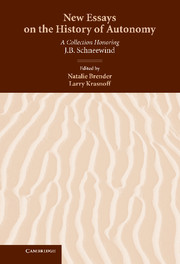Book contents
- Frontmatter
- Contents
- List of Contributors
- Acknowledgments
- Introduction
- PART ONE AUTONOMY IN CONTEXT
- 1 Justus Lipsius and the Revival of Stoicism in Late Sixteenth-Century Europe
- 2 Affective Perfectionism: Community with God without Common Measure
- 3 Autonomy and the Invention of Theodicy
- 4 Protestant Natural Law Theory: A General Interpretation
- 5 Autonomy in Modern Natural Law
- PART TWO AUTONOMY IN PRACTICE
2 - Affective Perfectionism: Community with God without Common Measure
from PART ONE - AUTONOMY IN CONTEXT
Published online by Cambridge University Press: 24 July 2009
- Frontmatter
- Contents
- List of Contributors
- Acknowledgments
- Introduction
- PART ONE AUTONOMY IN CONTEXT
- 1 Justus Lipsius and the Revival of Stoicism in Late Sixteenth-Century Europe
- 2 Affective Perfectionism: Community with God without Common Measure
- 3 Autonomy and the Invention of Theodicy
- 4 Protestant Natural Law Theory: A General Interpretation
- 5 Autonomy in Modern Natural Law
- PART TWO AUTONOMY IN PRACTICE
Summary
Voluntarism and antivoluntarism – radical alternatives?
One of the central themes woven through J. B. Schneewind's The Invention of Autonomy is that of community with God. Schneewind draws on the notion of community with God in order vividly to capture what was at stake between voluntarists and antivoluntarists in the seventeenth and eighteenth centuries; voluntarists denied that God and human beings are members of the same moral community, while antivoluntarists insisted that God and humans must share membership in this community. In effect, voluntarists held that God, to be God, must be sovereign and free, while antivoluntarists retorted that God must for the same reason instead be loving and just. It was antivoluntarism that won, historically speaking, the day, since most people found an arbitrary tyrant as God unacceptable. But antivoluntarism had difficulty retaining a substantial role for God within human morality, and, ironically, the dedicated efforts of antivoluntarists to defend God's moral character gave rise to forms of moral philosophy that marginalized or eliminated God's role altogether: intuitionism, utilitarianism and Kantianism.
The point of departure for this essay is a nagging suspicion that the range of options represented within modern moral thought was in fact rather limited. I wish to raise the possibility of a third alternative alongside affirming or denying moral community with God, to ask if the affirmation and the denial of moral community with God were perhaps not radical alternatives to one another, but rather had in common a certain framework for thinking of God's transcendence that in fact undermined that transcendence.
- Type
- Chapter
- Information
- New Essays on the History of AutonomyA Collection Honoring J. B. Schneewind, pp. 30 - 60Publisher: Cambridge University PressPrint publication year: 2004
- 2
- Cited by



